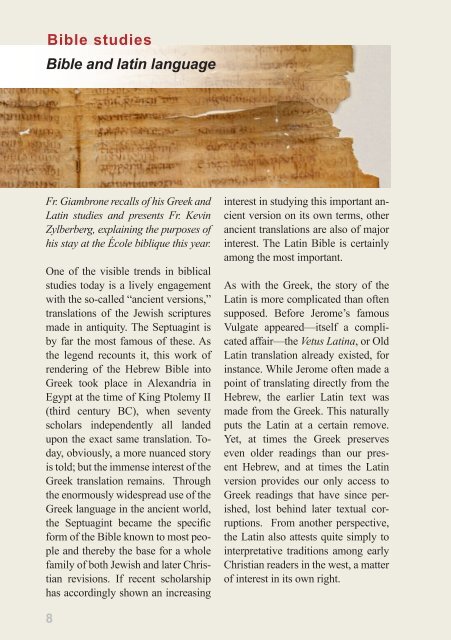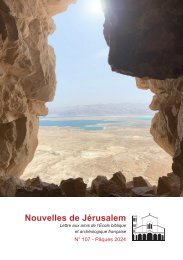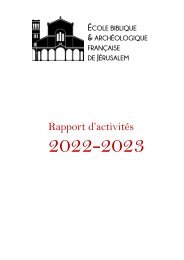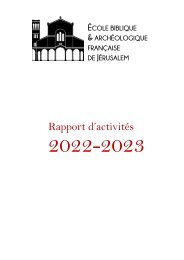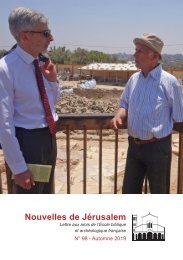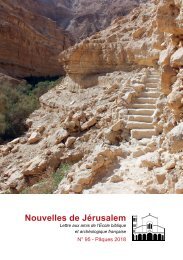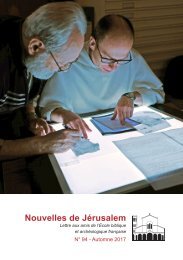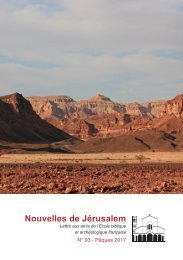Les Nouvelles de Jérusalem - Numéro 105 - Printemps 2023
Découvrez le n°105 des Nouvelles de Jérusalem. Numéro spécial sur la vie académique et l'orientation stratégique de l'École. Les Nouvelles de Jérusalem sont une revue d'informations de l'École biblique et archéologique française de Jérusalem, 2 à 3 fois par an, elles donnent un aperçu des travaux en cours en exégèse comme en archéologie, ici à Jérusalem. Les articles alternent français et anglais. Discover the n° 105 of the Nouvelles de Jérusalem. Special issue on the academic life and the strategic plan of the École. The Nouvelles de Jérusalem is an information review of the École Biblique et Archéologique française de Jérusalem, 2-3 times a year, they give an overview of the work in progress in both exegesis and archeology, here in Jerusalem. Articles are sometimes in French sometimes in English.
Découvrez le n°105 des Nouvelles de Jérusalem.
Numéro spécial sur la vie académique et l'orientation stratégique de l'École.
Les Nouvelles de Jérusalem sont une revue d'informations de l'École biblique et archéologique française de Jérusalem, 2 à 3 fois par an, elles donnent un aperçu des travaux en cours en exégèse comme en archéologie, ici à Jérusalem. Les articles alternent français et anglais.
Discover the n° 105 of the Nouvelles de Jérusalem.
Special issue on the academic life and the strategic plan of the École.
The Nouvelles de Jérusalem is an information review of the École Biblique et Archéologique française de Jérusalem, 2-3 times a year, they give an overview of the work in progress in both exegesis and archeology, here in Jerusalem. Articles are sometimes in French sometimes in English.
You also want an ePaper? Increase the reach of your titles
YUMPU automatically turns print PDFs into web optimized ePapers that Google loves.
Bible studies<br />
Bible and latin language<br />
Fr. Giambrone recalls of his Greek and<br />
Latin studies and presents Fr. Kevin<br />
Zylberberg, explaining the purposes of<br />
his stay at the École biblique this year.<br />
One of the visible trends in biblical<br />
studies today is a lively engagement<br />
with the so-called “ancient versions,”<br />
translations of the Jewish scriptures<br />
ma<strong>de</strong> in antiquity. The Septuagint is<br />
by far the most famous of these. As<br />
the legend recounts it, this work of<br />
ren<strong>de</strong>ring of the Hebrew Bible into<br />
Greek took place in Alexandria in<br />
Egypt at the time of King Ptolemy II<br />
(third century BC), when seventy<br />
scholars in<strong>de</strong>pen<strong>de</strong>ntly all lan<strong>de</strong>d<br />
upon the exact same translation. Today,<br />
obviously, a more nuanced story<br />
is told; but the immense interest of the<br />
Greek translation remains. Through<br />
the enormously wi<strong>de</strong>spread use of the<br />
Greek language in the ancient world,<br />
the Septuagint became the specific<br />
form of the Bible known to most people<br />
and thereby the base for a whole<br />
family of both Jewish and later Christian<br />
revisions. If recent scholarship<br />
has accordingly shown an increasing<br />
interest in studying this important ancient<br />
version on its own terms, other<br />
ancient translations are also of major<br />
interest. The Latin Bible is certainly<br />
among the most important.<br />
As with the Greek, the story of the<br />
Latin is more complicated than often<br />
supposed. Before Jerome’s famous<br />
Vulgate appeared—itself a complicated<br />
affair—the Vetus Latina, or Old<br />
Latin translation already existed, for<br />
instance. While Jerome often ma<strong>de</strong> a<br />
point of translating directly from the<br />
Hebrew, the earlier Latin text was<br />
ma<strong>de</strong> from the Greek. This naturally<br />
puts the Latin at a certain remove.<br />
Yet, at times the Greek preserves<br />
even ol<strong>de</strong>r readings than our present<br />
Hebrew, and at times the Latin<br />
version provi<strong>de</strong>s our only access to<br />
Greek readings that have since perished,<br />
lost behind later textual corruptions.<br />
From another perspective,<br />
the Latin also attests quite simply to<br />
interpretative traditions among early<br />
Christian rea<strong>de</strong>rs in the west, a matter<br />
of interest in its own right.<br />
Following the gui<strong>de</strong>lines of the Pontifical<br />
Biblical Commission in Rome,<br />
doctoral stu<strong>de</strong>nts at the École biblique<br />
are all expected to pass special<br />
exams on all the ancient versions.<br />
This inclu<strong>de</strong>s not only the Masoretic<br />
Hebrew and Septuagint Greek texts,<br />
therefore, but also the Aramaic Targums<br />
and, of course, the Latin Bible<br />
tradition. The Bible in Its Traditions<br />
project is naturally also highly invested<br />
in these same ancient versions,<br />
consciously advancing a polymorphic<br />
vision of the Church’s scriptures. In<br />
this connection, un<strong>de</strong>r the lea<strong>de</strong>rship<br />
of fr. Olivier-Thomas Venard, the<br />
BEST team has in fact un<strong>de</strong>rtaken a<br />
large-scale work to produce the first<br />
French translation of the Vulgate at its<br />
medieval height (as edited by Robert<br />
Weber and slightly revised by Roger<br />
Gryson for the Deutsche Bibelgesellschaft,<br />
Stuttgart, 2007). Prior to<br />
its post-tri<strong>de</strong>ntine editions, this text<br />
inspired many centuries of literary<br />
and artistic creation, and is therefore<br />
the necessary basis for an annotation<br />
in the history of its reception.<br />
In this broad context, the <strong>de</strong>cision<br />
was ma<strong>de</strong> to invite a young specialist<br />
in the Vetus Latina, Fr. Kevin Zilverberg,<br />
associate professor at the University<br />
of St. Thomas (MN, USA), to<br />
spend a semester at the Ébaf as professeur<br />
invité. Fr. Zilverberg’s SSD<br />
dissertation, entitled The Textual History<br />
of Old Latin Daniel from Tertullian<br />
to Lucifer (Madrid, 2021), won<br />
the Bibeau Award for the best dissertation<br />
at the Biblicum in 2019-2020.<br />
Fr. Zilverberg’s stay at the Ecole had<br />
two official objectives. First, he offered<br />
a two-hour per week course<br />
introducing stu<strong>de</strong>nts to the tools and<br />
techniques used in serious study of<br />
the Latin Bible. Avidly followed by<br />
both doctoral stu<strong>de</strong>nts and others,<br />
this course provi<strong>de</strong>d a sound, initial<br />
orientation to the subject matter. At<br />
the same time, Fr. Zilverberg helped<br />
co-organize a special journée d’étu<strong>de</strong>s<br />
at the Ecole centered on the theme<br />
“Election in the Latin Bible.” For this<br />
event, which took place on December<br />
15, he was joined by two other invited<br />
scholars: José Manuel Cañas Reíllo<br />
and Pablo Toribio, both researchers<br />
at the CSIC (Consejo Superior <strong>de</strong> Investigaciones<br />
Científicas) in Madrid.<br />
Łukas Popko from the Ébaf was the<br />
fourth speaker. Each speaker ma<strong>de</strong> a<br />
very fine contribution, approaching the<br />
subject from some strikingly different<br />
perspectives. Together with several<br />
other solicited studies, these papers<br />
will ultimately be edited and published<br />
in the series Étu<strong>de</strong>s bibliques.<br />
Fr. Anthony Giambrone, OP<br />
Vice Director<br />
8<br />
<strong>Nouvelles</strong> <strong>de</strong> Jérusalem - N° <strong>105</strong> - Pâque <strong>2023</strong>


